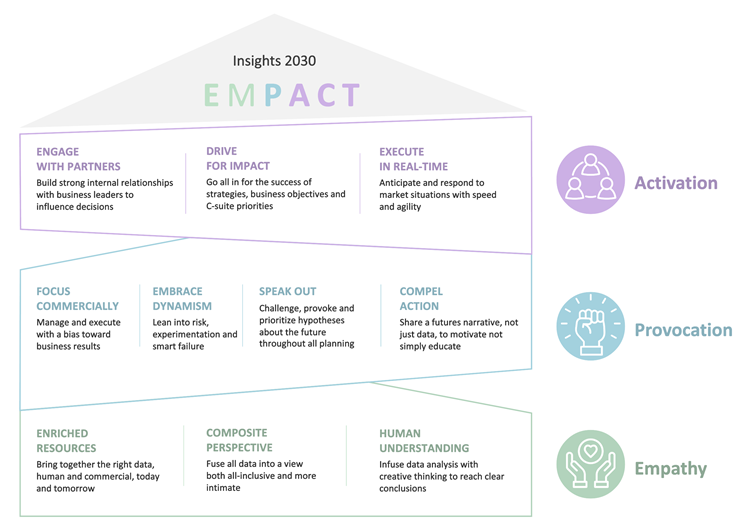AI and Research
With AI now in the mix, the question on the table for insights organizations is whether research skills are relevant anymore. Or rather, which skills will be relevant for the future of commerce.
In particular, insights must reinvent itself as AI takes over the research process—writing and programming questionnaires, sampling and interviewing respondents, tabulating and modeling results. As things like synthetic sampling become more refined, data collection may shift from survey responses to social mood. Even some of the thinking that we believe is uniquely human will be done by AI, such as figuring out the headline takeaways for charts or recommending the next iteration of ad copy based on test results.
Much of this future is here already. We know because we are doing these things at Kantar. Not to make insights irrelevant. But to improve insights by helping insights teams navigate this transition to win.
AI and Imagination
Preparing insights teams for the future is an ongoing priority of ours. In the early teens of this century, Kantar collaborated with a consortium of industry leaders to reexamine the requirements for insights organisational excellence—skills, resources, data, tools, reporting, relationships. We dubbed it Insights 2020, work which provided an insights benchmarking framework known as the Insights Engine.
With the spike of volatility and disruption in recent years—a reality that the pandemic brought home—we updated our previous work two years ago with Insights 2030. The Big Data challenges at the heart of the prior framework are no less important, but new complexities demand a fresh framework grounded in the imperative of imagination, which is the House of Insights pictured here. Insights organisations must be stewards of the imaginative enterprise it will take to thrive in the future.

Now, with the explosion of AI, generative AI especially, the importance of imagination is greater than ever, and thus resourcefulness and originality, too. A step beyond Insights 2030 is needed. AI must figure prominently in any assessment of where insights is headed and of what is needed for insights to be relevant and consequential in shaping the future of brands as stewards of the corporate imagination.
AI as Human+
We have again updated our benchmarking of excellence for insights organisations. The House of Insights framework itself, with its three critical areas of empathy, provocation and activation, remains relevant in the era of AI. But the components making up each area will be affected in different ways by AI. Some will be taken over completely by AI. Others will remain the province of insights professionals. The job and function of insights will be changed in significant ways by the impact of AI-related innovation. The best characterisation of what’s ahead is AI 2030.
This not about AI replacing people. It’s about AI enhancing what people do and enabling smart people to do even smarter things by automating routine tasks and project management. This sort of symbiosis is humans plus AI. AI will manage research more efficiently, thereby equipping and empowering insights teams to better steward imagination.
This is not merely about keeping up. There is a first-mover opportunity. Marketers are lagging with AI; insights even more. Kantar conducts a regular tracking of marketing professionals for the American Marketing Association. In the latest survey conducted in Q2 2023, nearly two-thirds admitted they have little understanding of AI. Almost no one thinks AI is a fad. But with the single exception of copywriting, only small percentages have deployed AI for research, sales, customer service or marketing campaigns.
Insights organisations that move with pace and agility in the direction of AI 2030 will be able to bring their brands and companies along faster, more expertly, and more imaginatively. This is the imperative at hand for insights.
AI 2030 and Empathy
This article is the first in a series about AI 2030. This series will assess the impact of AI on each of the key areas of the House of Insights, along with implications for the commercial and business role of insights leaders.
Let’s start with empathy, the foundation of the House of Insights.
Empathy means a deeper, more expansive, more compassionate understanding of the lives, aspirations and motivations of consumers. Not just Big Data, but human data, so to speak. Our work identified three component elements of empathy—a diversity of enriched, forward-looking data, a composite, multi-sourced view of the marketplace, and an affinity, even a rapport, with people’s lived experience. These are the elements that leading companies are more likely to do than trailing companies.
AI will take over everything to do with data. AI will not only process it faster and model it better. AI will integrate more data more quickly and more comprehensively. Technology is all about data, so the better the technology, the better the management of data. Diverse, composite data, the first two elements of empathy, will be fully handled by AI, thus obviating the need for insights professionals to master these skills and competencies (although ensuring the integrity and quality of data will remain with humans).
AI will also boost efficiency with data, not just competency. This will mean a shift of focus and maybe even some headcount reduction. But mostly it will mean more time and headspace for insights professionals to deepen their understanding of the human experience of customers and the ways in which brands can better meet the needs of people living in a world of greater volatility and disruption.
For insights teams to strengthen and deepen their sense of empathy, there are three AI 2030-related areas that must be benchmarked and enhanced.
- How well insights professionals manage AI to manage data.
- Including: AI training protocols and datasets. Prompts. Data diversity. Data quality, especially datasets used for AI training. Ethics, especially as embedded in algorithms. Troubleshooting. Technology management.
- The breadth, sophistication and quality of AI tools and data, and how well-integrated everything is with business decision-making.
- Such as: Iterative testing of ads and new products. Identifying latent drivers and attributes. Building real-time media spending or shelf space allocation models. Ensuring the consistency of brand messaging. Optimising the content of marketing communications. And so forth across a comprehensive set of use cases and applications.
- Training, exercises and processes to build skills, competencies, thinking and ingenuity when managing AI as a creative research assistant. Not just efficiency, but also originality.
- Focusing on: Data visualization. Data mining. Pattern recognition. Avoiding cognitive biases and over-interpretation. Developing and assessing scenarios and Black Swans.
- Focusing on: Data visualization. Data mining. Pattern recognition. Avoiding cognitive biases and over-interpretation. Developing and assessing scenarios and Black Swans.
The overarching benchmarking question is whether AI is making insights professionals more empathetic. Or to put it another way, benchmarking how well insights professionals are using AI to get smarter and more compassionate, as opposed to misappropriating AI to get by with doing less.
Leading insights organisations will utilise AI as an assistive technology to enhance the performance of insights professionals. This is Human+. In the process, old-school research skills will figure less if at all in the hiring profile for corporate insights teams. Instead, research skills will be found either with partner research firms or within IT functions responsible for ensuring software integrity.
In the future of AI 2030, insights leaders will be asked only to use their imaginations. Never to flex their research muscles, except when needed to ensure data integrity. Nor to substitute AI for empathy. Leading companies will combine humans plus AI for a competitively superior understanding of the lived experience of consumers.


